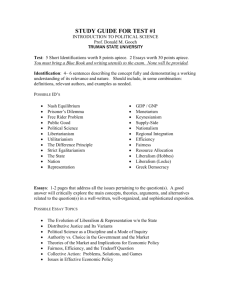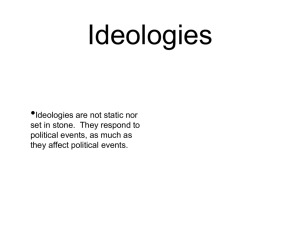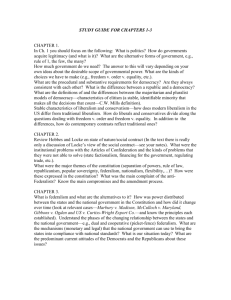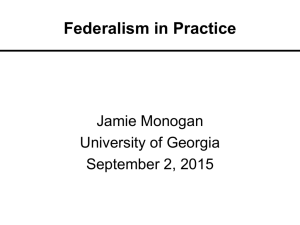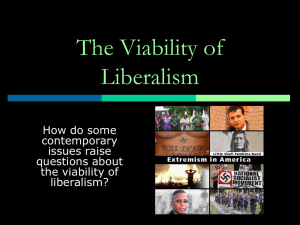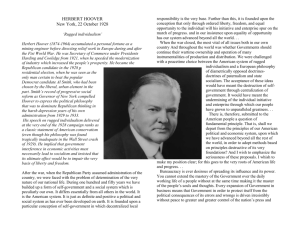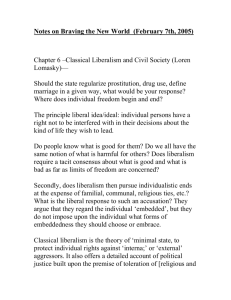The Origins of Liberalism
advertisement
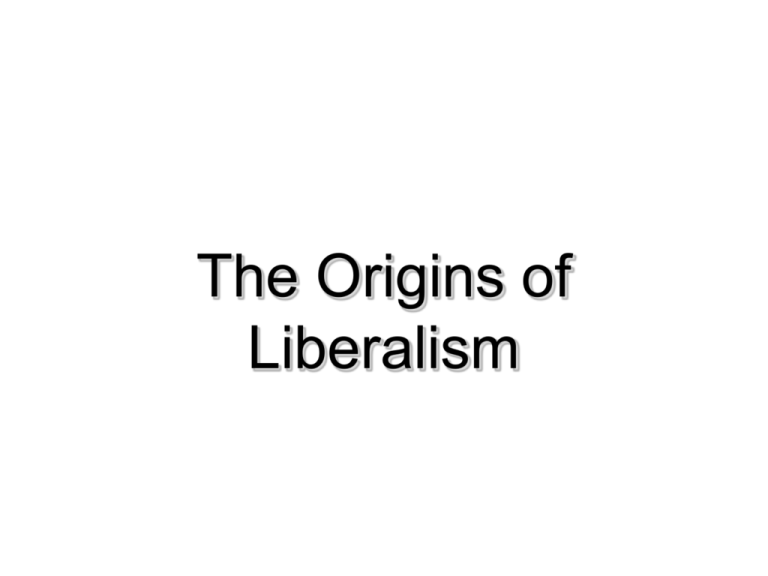
The Origins of Liberalism What Do all doofallthese these definitions definitions pertain tellthis us down! about to SS Do not write –adjective the idea30?? of “liberal”? 1. favorable to progress or reform, as in political or religious affairs. 2. ( often initial capital letter ) noting or pertaining to a political party advocating measures of progressive political reform. 3. of, pertaining to, based on, or advocating liberalism. 4. favorable to or in accord with concepts of maximum individual freedom possible, especially as guaranteed by law and secured by governmental protection of civil liberties. 5. favoring or permitting freedom of action, especially with respect to matters of personal belief or expression: a liberal policy toward dissident artists and writers. 6. of or pertaining to representational forms of government rather than aristocracies and monarchies. 7. free from prejudice or bigotry; tolerant: a liberal attitude toward foreigners. 8. open-minded or tolerant, especially free of or not bound by traditional or conventional ideas, values, etc. 9. characterized by generosity and willingness to give in large amounts: a liberal donor. 10. given freely or abundantly; generous: a liberal donation. 11. not strict or rigorous; free; not literal: a liberal interpretation of a rule. 12. of, pertaining to, or based on the liberal arts. 13. of, pertaining to, or befitting a freeman. lib·er·al Liberal • The word liberal comes from the Latin liber, meaning free • The word Liberal is used to describe a way of thinking and was first used in Spain during the Napoleonic Wars (think about the motto of the French Revolution) • Liberalism is a left wing philosophy because it advocates in favour of the reform of government • Liberalism is associated with being openminded and supporting freedom of speech and freedom within actions The Four Basic Principles of Classical Liberalism 1. Primacy of Individual Rights and Freedoms: • free speech, religious liberty, the right to private property, and the right to political opposition 2. Human Beings are Rational: • can make rational decisions that will benefit both themselves and society 3. Government should protect our civil liberties: • The government is there to prevent people from harming each other through force and fraud 4. Constitutional limitations on Government: • The government must follow the constitution (rule of law) • Government is responsible to people and may be changed by them Why did Liberalism appear? Who is to blame? Watch this Blame the King John of England • The Magna Carta (1215) • • Gave people other than the king some liberties Made king accept that his will was not arbitrary • for example by explicitly accepting that no "freeman" (in the sense of non-serf) could be punished except through the law of the land (RULE OF LAW) Blame Fleas • • • • The Black Death 1347-1351 killed one out of three people Created new opportunities for survivors Blame Columbus • • Expansion of trade, commerce, and exploration Columbus’ discovery of a “new world” was a symbol of great possibilities Blame Martin Luther • • • • Protestant Reformation 1521 Luther his nailed 95 Theses to church door Favoured strict attention to scripture Unintentionally paved the way for individual liberty-people were supposed to interpret for themselves Blame Greedy English Kings • • • • England’s Glorious Revolution of 1688 Taxation battle between the House of Stuart and Parliament Mainly a war of words Produced much thought and theorizing Blame Thomas Hobbes • • • Wrote Leviathan Felt people should obey those in power But, believed in self interest rather than God’s command Hobbes • • • • • Imagined people in a ‘State of Nature’ All have natural right to do what they want Problem is Human Nature With no authority, war of all against all So, fearful and rational individuals enter into a social contract to establish authority Blame John Locke • • • • Individuals are rational Inconveniences in State of Nature Enter into Social Contract to protect Life, Liberty, and Property Emphasis on Consent and Limited Government Locke • was the first to argue that individuals had innate rights of life, liberty and property • Social Contract: Government comes about through the agreement of free individuals that their rights are best protected by associating with one another • If the Contract was broken the people have the right to rebel More Locke • Locke’s ideas justified the Glorious Revolution in Britain in 1688, the American Revolution of 1776 and the French Revolution of 1789 • The purpose of government is basically to protect the people in their ‘life, health, liberty, or possessions’. • Locke believed that people should have a ‘private sphere’ that the government could not interfere with – religion in particular – the state should be tolerant of all religions Liberalism in Action Classical Liberalism in Economics • Classical liberalism is identified in the economy as a free market economy • The ideas a free market economy were brought to life by Adam Smith • Adam Smith wrote ‘The Wealth of Nations’ • Adam Smith wrote about the Invisible Hand – this implies that human needs are best served by free competition in the marketplace – along the same ideas as liberalism American Declaration of Independence • • Let’s take a look at ‘Schoolhouse Rock’ to learn about the U.S. Constitution and the Declaration of Independence of 1776 “We hold these truths to be selfevident, that all men are created equal, that they are endowed by their creator with certain unalienable rights: that among these are life, liberty and the pursuit of happiness; that to secure these rights governments are instituted by men, deriving their just powers from the consent of the governed…… Liberalism in the Declaration of Independence • All men are created equal. Ideal of political and legal equality. • They are endowed by their Creator with certain • • • unalienable rights, ...among these are life, liberty & the pursuit of happiness. Governments are instituted to protect those rights. Government derives its powers from the consent of the governed. Political authority is in the people, acting through representatives. When a government becomes destructive of those rights the people have a right to alter or abolish it. French Revolution and the Declaration of the Rights of Man • The National Assembly also took to Locke’s ideas and put those very ideas into their Declaration of the Rights of Man and of the Citizen • “The end of all political associations is the preservation of the natural and imprescriptibly rights of man; and these rights are liberty, property, security, and the resistance of oppression.” • Portrays the idea called ‘Rule of Law’. Evolution of liberalism • • The result was laissez faire capitalism. Terrible economic & social conditions for workers, including children. Government powerless to act. Led to rethinking liberalism. A good society might need more than right procedures. It also needed certain outcomes. Evolution, continued • • • The philosophy of Utilitarianism emerged. Governments should pursue policies that create the greatest good (or utility) for the greatest number of people. This utility calculation would provide a rational guideline for government policy. Utilitarianism was a challenge to the status quo. The demand that everyone count for one, and one only, was seen as wrong to the elitist society of Britain Further developments • • • After utilitarianism (which never caught on in the U.S.), liberalism developed into Social Justice or Modern Liberalism. Modern liberalism is not fearful of government power. Instead, government power can be a force for good, limiting the worst conditions of poverty, illiteracy, racism, exploitation, etc. The basis of progressive or liberal politics in the U.S. Robert Owen • • • • believed that humanity is no better than its environment. Since people are shaped by environment, improvement of that environment can produce a paradise on earth. (Utopian Socialism) Owen shocked business and government leaders by stating that the development of machine production, if organized entirely for profit, would inevitably lead to poverty and degradation for workers. His solution was Villages of Cooperation- kitchens, reading rooms, and sitting rooms be used in common. A different view of freedom • T.H. Green (1836-1882) • • Freedom means the ability as well as the right to do something. Expansive liberty. Two types of freedom: • • Negative freedom: freedom from government intervention (e.g., Bill of Rights). Positive freedom: freedom requires government to intervene in social & economic spheres (e.g., education, health care, housing). A different view of freedom • Government responsible for creating the conditions for freedom. • • This view implies an active and interventionist government. Take an unemployed and homeless woman for example. Classical liberals would consider her free because government does not restrain her. But is she really free to make rational choices? • • • An activist view of government Jane Addams (1860-1935) Founded Hull House to serve the poor in Chicago in 1889. Pushed for laws to improve working and living conditions for the poor. Promoted government action in education, better sanitation, & women’s right to vote. Evolution of Modern Liberalism • • Key thinker: J.S. Mill (1806-1873) He worked with his wife & intellectual partner Harriet Taylor Mill (18071858) John Stuart Mill • • • • English political theorist Wrote On Liberty in 1859 Also wrote a book in favour of women’s rights He is considered a bridge between classical liberalism and modern liberalism John Stuart Mill • John Start Mill put together many themes on liberalism in his book entitled ‘On Liberty’. • His ideas impacted many people throughout history. Let’s hear what Teddy Roosevelt said about liberty. • “The only purpose for which power can be rightfully exercised over any member of a civilized community, against his will, is to prevent harm to others.” Mill Aboriginal Contributions to Liberalism • • It has been argued that many of the principles of liberalism originated in traditional Aboriginal societies. In Canada, our Aboriginal communities use liberal ideas such as elected leaders, government by consensus, leadership on the basis of merit, just punishment, and concepts of equality and equality before the law. On Liberty • Throughout this book, Mill exhibits a deep concern with tyranny, both political and social. What is social tyranny? On Liberty • “The tyranny of the prevailing opinion and feeling, ... the tendency of society to impose... its own ideas and practices as rules of conduct on those who dissent from them, ... to prevent the formation of any individuality not in harmony with its ways.” • • • Social tyranny & conformity The individual has a sovereign right over his or her self, body and mind, a right to be free of societal interference in our lives. Does that mean that society can NEVER interfere in our choices? If not, when can it? What is the guiding principle? From “On Liberty” • “The sole end for which mankind are warranted, individually or collectively... in interfering with the liberty of action of any of their number, is self-protection." From “On Liberty” • • • Society can interfere, but for one reason only: to stop harm to others. Society may protect itself and other individuals. But society may NOT interfere in order to protect us from our own bad choices. So, is does a behaviour affect others? Or only ourselves? Can society interfere? • A 75-year old man who is slowly and painfully dying of cancer decides to end his life. NO Can society interfere? • A CCHS student reads Mein Kampf and thinks that Adolph Hitler had some great ideas. NO Can society interfere? • Two adult gay men decide to set up a home together. NO Can society interfere? • • That CCHS student who likes Hitler’s ideas organizes an anti-Semitic rally outside the home of a rabbi at 2 a.m. Can society interfere, according to Mill? Can society interfere? • • • • YES Why? A. In conduct, the individual “must not make himself a nuisance to other people.” B. This conduct might lead to an act of violence. Mill gave the example of publishing the view that corn dealers starve the poor, which is a protected activity, versus a speech before an excited mob outside the home of a corn dealer, which is not. Can society interfere? • • A 14-year-old decides to drop out of school in order to get a job. Can society interfere? Why or why not? YES. WHY? People who are under the legal age of adulthood are excluded; society may regulate them for their own good. Can society interfere? • Two men are boating on Dried Meat Lake without life jackets. NO Can society interfere? • Two men are boating on Dried Meat Lake without life jackets and they are drinking heavily. YES. WHY? THEY POSE A RISK TO OTHERS Can society interfere? • The two men are now on shore, somewhat sober. One man, who can’t swim, slips into the water and drowns. The other man just stands and watches. YES. WHY? WE ARE ACCOUNTABLE FOR OUR FAILURE TO ACT TO STOP HARM. Mill and Foreign Policy • Would Mill have agreed with U.S. military intervention to throw out a dictator and help establish a democracy? Mill and Foreign Policy • “I am not aware that any community has a right to force another to be civilized. So long as the sufferers by the bad law do not invoke assistance from other communities, I cannot admit that persons entirely unconnected with them ought to step in...” • What do you think? Great Law of Peace • The Great Law of Peace provided the Haudenosaunee peoples with a constitution that dates back to the 15th century. • The Great Binding Law, as it sometimes is referred to, has three main principles: righteousness, health and power – all characteristics of liberalism. Liberalism in Canada • • • In 1982 the Canadian Charter of Rights and Freedoms advanced the liberal cause by entrenching into the Canadian Constitution (Canada Act) both basic liberties and new linguistic (language) rights for minorities. The purpose of the Charter was to entrench (dig in) rights, especially language rights, where no government could ever take them away. With the Charter as a shield a single citizen can achieve Locke’s vision of a society in which rights take precedence over authority. Modern Liberalism •Liberals today generally believe today that every individual is unique. The purpose of life is to realize that potential, and to become whatever it is one is capable of becoming. •The role of the state (government) is to produce the conditions under which individuals have the broadest possible choice in deciding upon their definition of good. •Society, meanwhile, should celebrate this diversity while giving equal treatment to all, regardless of a person’s origins, colour, sex or status in life. •In exchange for this respect, the individual must acknowledge responsibility for his own fortunes and for the fortunes of the community.

